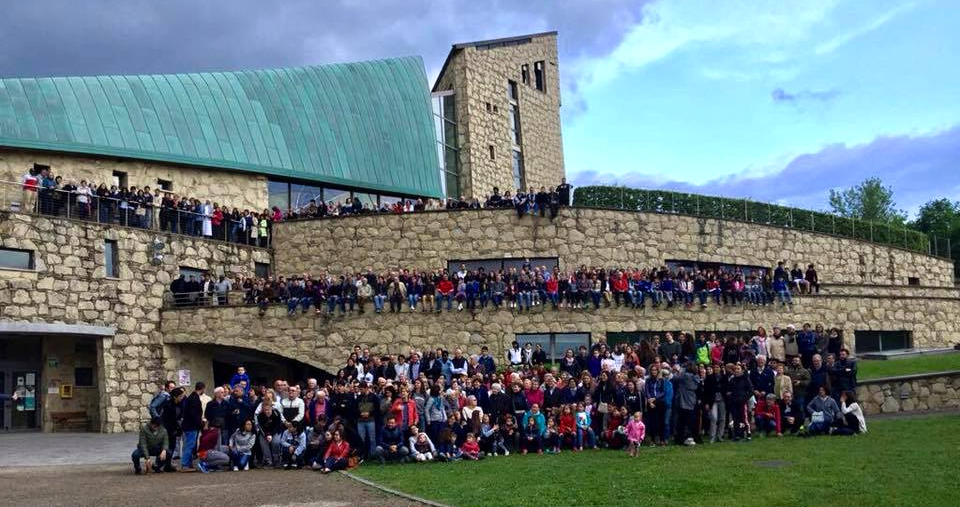
7 May 2018 | Focolare Worldwide
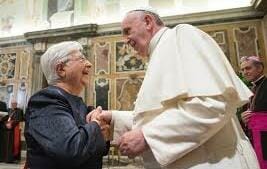 In Loppiano all is ready to welcome the Holy Father. Around 6,000 people from all over Italy are arriving, but thousands will be linked up in streaming in the five continents. We asked Maria Voce, Focolare President, how this encounter will take place. “We want to present to the Pope.” she explained, “this tiny town, the first among other 24 diffused worldwide, which wants to offer a model of coexistence founded on the evangelical principles of solidarity and fraternity, certainly unique, but able to be spread and repeated elsewhere. In Loppiano, the Pope will not only meet the 750 inhabitants, ” Maria Voce continued, “but also a representative group of the Focolare’s global family. We shall ask him some questions on themes that we hold dear: the challenge of fidelity to the charismatic idea of Chiara Lubich in contrast with the changed conditions of today; the education of the young people in a culture of fraternity; and Loppiano’s model of coexistence as a contribution to the current announcement of the Christian message and the overcoming of barriers, nationalism and prejudices.” The Focolare Movement is a variegated constellation that places at the core of its actions and dialogue a lifestyle that concurs to construct unity and peace in the world. It counts over 2 million members belonging to many Christian Churches, but also of different religious beliefs and lay inspirations. It undertakes around 1,000 social actions underway in various countries, and around 800 enterprises worldwide that work according to the principles of the Economy of Communion. The Sophia University, based precisely in Loppiano is now in its tenth year of life.
In Loppiano all is ready to welcome the Holy Father. Around 6,000 people from all over Italy are arriving, but thousands will be linked up in streaming in the five continents. We asked Maria Voce, Focolare President, how this encounter will take place. “We want to present to the Pope.” she explained, “this tiny town, the first among other 24 diffused worldwide, which wants to offer a model of coexistence founded on the evangelical principles of solidarity and fraternity, certainly unique, but able to be spread and repeated elsewhere. In Loppiano, the Pope will not only meet the 750 inhabitants, ” Maria Voce continued, “but also a representative group of the Focolare’s global family. We shall ask him some questions on themes that we hold dear: the challenge of fidelity to the charismatic idea of Chiara Lubich in contrast with the changed conditions of today; the education of the young people in a culture of fraternity; and Loppiano’s model of coexistence as a contribution to the current announcement of the Christian message and the overcoming of barriers, nationalism and prejudices.” The Focolare Movement is a variegated constellation that places at the core of its actions and dialogue a lifestyle that concurs to construct unity and peace in the world. It counts over 2 million members belonging to many Christian Churches, but also of different religious beliefs and lay inspirations. It undertakes around 1,000 social actions underway in various countries, and around 800 enterprises worldwide that work according to the principles of the Economy of Communion. The Sophia University, based precisely in Loppiano is now in its tenth year of life.  Upon his arrival in the town, the Holy Father will go directly to the Church of Maria Theotókos, where he shall stop briefly to pray. He will also pray before the painting of the Madonna with Child, the work of a painter belonging to the Hindu religion and symbol of the dialogue which is one of the many pillars of coexistence in Loppiano. Then in the churchyard, Maria Voce will greet the Pope on behalf of the Focolare Movement. A moment of dialogue will follow in which some citizens of Loppiano will ask him some questions. This session will be interrupted with music pieces of artists from various countries and religious environments. Lastly, around 30 citizens will personally greet the Pope who will leave to return to the Vatican, after the benediction.
Upon his arrival in the town, the Holy Father will go directly to the Church of Maria Theotókos, where he shall stop briefly to pray. He will also pray before the painting of the Madonna with Child, the work of a painter belonging to the Hindu religion and symbol of the dialogue which is one of the many pillars of coexistence in Loppiano. Then in the churchyard, Maria Voce will greet the Pope on behalf of the Focolare Movement. A moment of dialogue will follow in which some citizens of Loppiano will ask him some questions. This session will be interrupted with music pieces of artists from various countries and religious environments. Lastly, around 30 citizens will personally greet the Pope who will leave to return to the Vatican, after the benediction.
Live streaming 10 May 2018, 10.00am till 12.00 noon (CEST): Vatican Media Live http://live.focolare.org
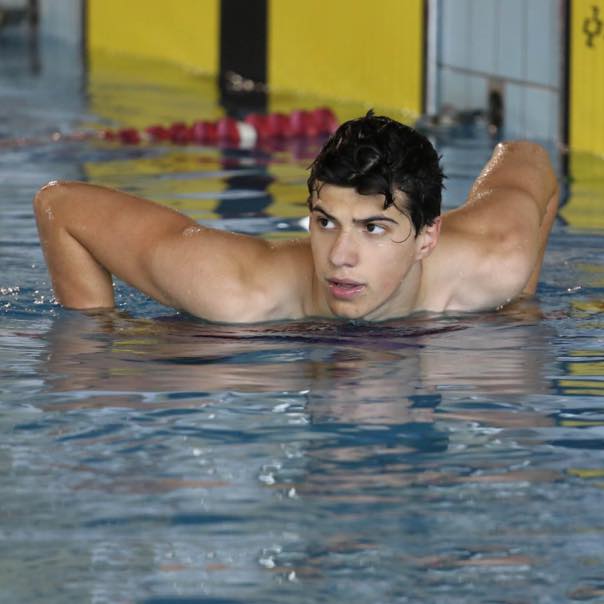
6 May 2018 | Focolare Worldwide

Simon Barlaam
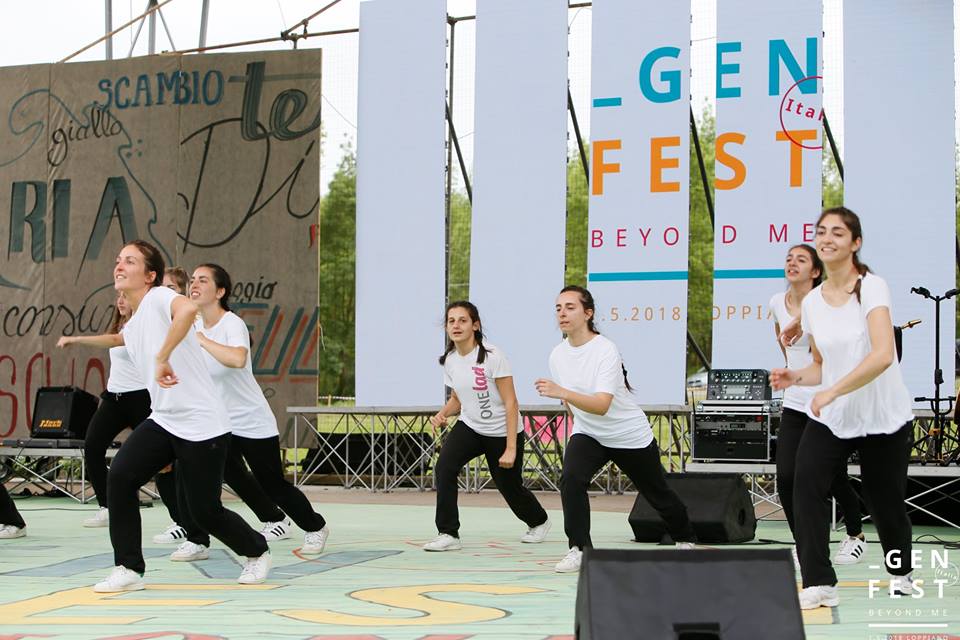
4 May 2018 | Focolare Worldwide
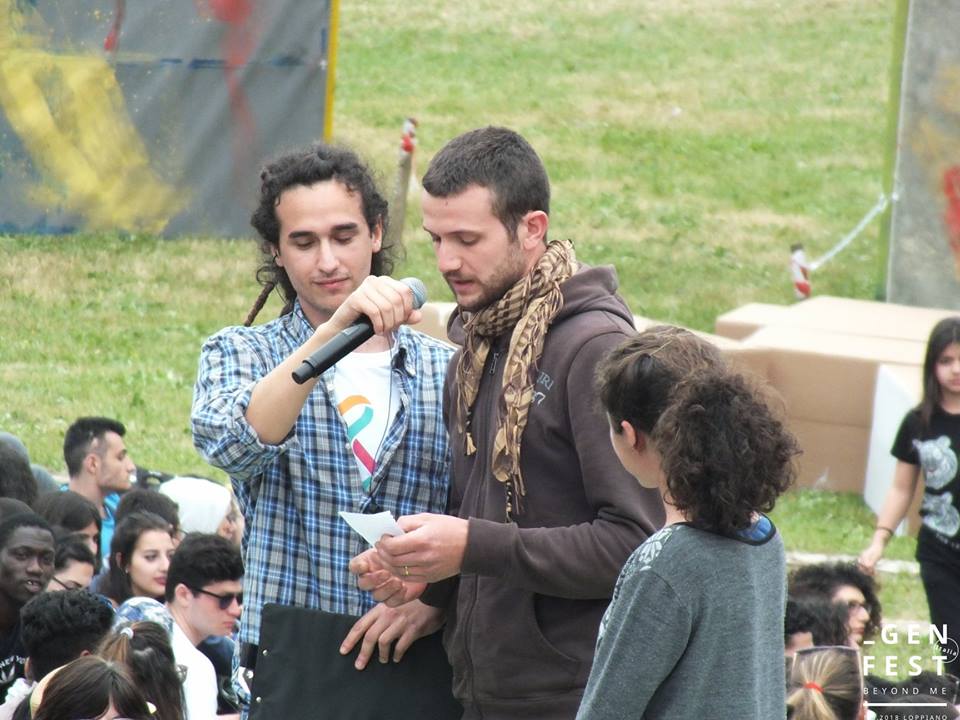 “My family is Christian and refuses to kill or carry weapons,” says George, a young Syrian from Homs. We’re in Loppiano, the Focolare international town near Florence, Italy where hundreds of young people from all over country have gathered for a meeting that include testimonies, sharing and much festivity. This year the event was held in anticipation of the much larger international Genfest, which will be heldnext month in Manila, Philippines (http://y4uw.org/it/events/genfest-2018/). The May 1st gathering was the Italian edition where 3700 young people took part in a one-day celebration of fraternity with reporting on projects, social action, personal experiences in which people came face to face with the personal dramas and pain of humanity. As in the case of George and Michael who left everyone breathless with their description of what they have been experiencing for years years in Syria. “We’ve seen many people die,” says George. “For a period of time I even had to carry a knife to protect myself, to defend myself in case of danger. Years of hatred, death and loss of dignity had emptied my heart and I began to think that love didn’t exist. Only the Mariapolis was able to remove this thought from my mind (several days spent living in the light of the Gospel, an annual gathering of the Focolare). After that Mariapolis I never carried a knife again and decided to start responding to hatred with love.” The final appeal to the young people was strongly embraced: “Don’t complain about your life. It’s beautiful, you just don’t realize it.”
“My family is Christian and refuses to kill or carry weapons,” says George, a young Syrian from Homs. We’re in Loppiano, the Focolare international town near Florence, Italy where hundreds of young people from all over country have gathered for a meeting that include testimonies, sharing and much festivity. This year the event was held in anticipation of the much larger international Genfest, which will be heldnext month in Manila, Philippines (http://y4uw.org/it/events/genfest-2018/). The May 1st gathering was the Italian edition where 3700 young people took part in a one-day celebration of fraternity with reporting on projects, social action, personal experiences in which people came face to face with the personal dramas and pain of humanity. As in the case of George and Michael who left everyone breathless with their description of what they have been experiencing for years years in Syria. “We’ve seen many people die,” says George. “For a period of time I even had to carry a knife to protect myself, to defend myself in case of danger. Years of hatred, death and loss of dignity had emptied my heart and I began to think that love didn’t exist. Only the Mariapolis was able to remove this thought from my mind (several days spent living in the light of the Gospel, an annual gathering of the Focolare). After that Mariapolis I never carried a knife again and decided to start responding to hatred with love.” The final appeal to the young people was strongly embraced: “Don’t complain about your life. It’s beautiful, you just don’t realize it.” 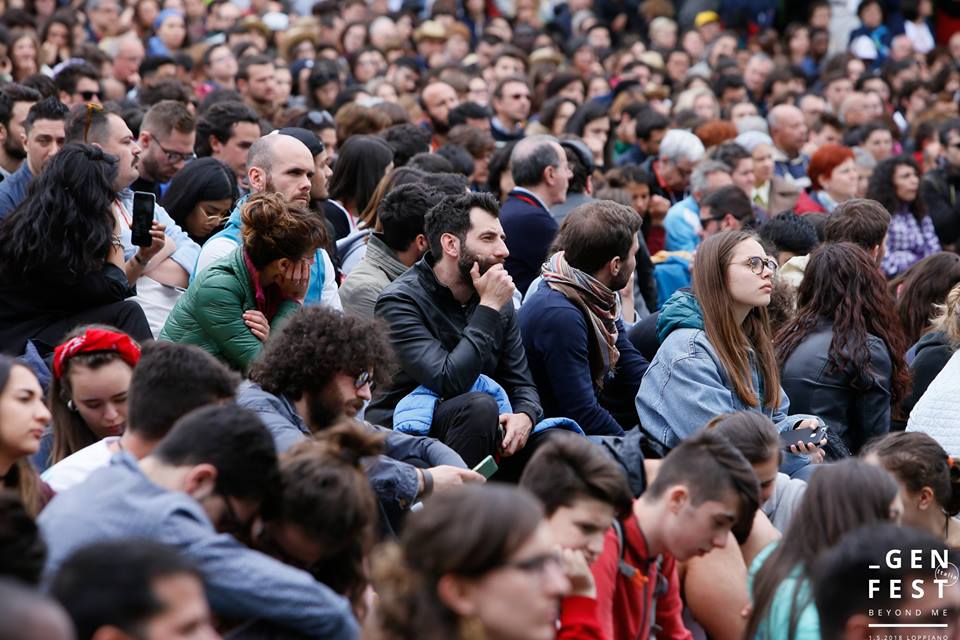 The conducting thread of the event, which was entitled “Beyond Me”, was the desire to go beyond one’s limits and boundaries in order to bring about a personal and, especially, a social change. Roberto Spuri and Elena Sofia Ferri bore witness to this as they told about the experience of the earthquake in Central Italy; Alessio Lanaloni and Maria Chiara Cefaloni, with their efforts for a disarmed economy; Alessandra Leanza, with the experience of volunteering with Rom children in Sardinia. And Marco Voleri, the internationally renowned tenor and founder of “Sintomi di Felicita” which promotes public awareness of multiple sclerosis; Simone Barlaam, para-olympic swimming champion at the Mexican world games. Michele Tranzuilli, author of the book Una buona idea and promoter of the bridge with Africa YouAid; Sara Fabris, painter.
The conducting thread of the event, which was entitled “Beyond Me”, was the desire to go beyond one’s limits and boundaries in order to bring about a personal and, especially, a social change. Roberto Spuri and Elena Sofia Ferri bore witness to this as they told about the experience of the earthquake in Central Italy; Alessio Lanaloni and Maria Chiara Cefaloni, with their efforts for a disarmed economy; Alessandra Leanza, with the experience of volunteering with Rom children in Sardinia. And Marco Voleri, the internationally renowned tenor and founder of “Sintomi di Felicita” which promotes public awareness of multiple sclerosis; Simone Barlaam, para-olympic swimming champion at the Mexican world games. Michele Tranzuilli, author of the book Una buona idea and promoter of the bridge with Africa YouAid; Sara Fabris, painter.  Projects. All the stories that were told at Genfest-Italy were connected to concrete experiences: an association, a social project, which anyone could “adopt” in the coming year. This was the call to action that was launched at the end of the event with an invitation to each young person to choose a project and replicate it everywhere else. To facilitate their work, the associations that are actively engaged in the cities of Italy posted links on the United world project website, according to region. Genfest Italy concluded with a city that “flying” city, a city that was depicted in the final choreography that was based on a meditation by Chiara Lubich: “One City Is Not Enough:” “For God, one city is too little. He made the stars, guided the destiny of Time. With God you can see farther, to everyone’s country, to the whole globe. At the end of life let us not have to regret that we loved too little.” Loppiano is getting ready to welcome Pope Francis on May 10th, and it wasn’t by chance that a group of young people from Nomadelfia was at Genfest Italy bringing the greetings of their community, which will also be visited by Pope Francis on the same day. As we prepare to welcome him our friendship is growing and intensifying. Source: www.cittanuova.it Flickr photo gallery
Projects. All the stories that were told at Genfest-Italy were connected to concrete experiences: an association, a social project, which anyone could “adopt” in the coming year. This was the call to action that was launched at the end of the event with an invitation to each young person to choose a project and replicate it everywhere else. To facilitate their work, the associations that are actively engaged in the cities of Italy posted links on the United world project website, according to region. Genfest Italy concluded with a city that “flying” city, a city that was depicted in the final choreography that was based on a meditation by Chiara Lubich: “One City Is Not Enough:” “For God, one city is too little. He made the stars, guided the destiny of Time. With God you can see farther, to everyone’s country, to the whole globe. At the end of life let us not have to regret that we loved too little.” Loppiano is getting ready to welcome Pope Francis on May 10th, and it wasn’t by chance that a group of young people from Nomadelfia was at Genfest Italy bringing the greetings of their community, which will also be visited by Pope Francis on the same day. As we prepare to welcome him our friendship is growing and intensifying. Source: www.cittanuova.it Flickr photo gallery
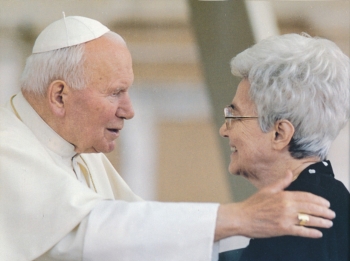
3 May 2018 | Focolare Worldwide
 “The path of a prophecy”. On the tenth anniversary of the death of Chiara Lubich, founder of the Focolare Movement, a conference was held on 3rd May promoted by the Italian Embassy to the Holy See in conjunction with the Sovereign Military Order of Malta, and in collaboration with the Focolare. It was an opportunity for a reflection on the economy in the light of the charism of unity. Mgr. Giovanni Angelo Becciu, the Vatican Deputy Secretary of State, Maria Voce, president of the Focolare Movement, Luigino Bruni, professor of Economics at the LUMSA University of Rome, Leonardo Becchetti, professor of Economics at the University took part of Rome Tor Vergata, and Simona Rizzi, president of the Tassano Servizi Territoriali Consortium. In her speech, Maria Voce said that the Focolare Movement “would not achieve its vocation if it did not implement the first page of the Christian social doctrine, the prayer of the Magnificat in which among other things it says: “He filled the hungry with good things and sent back the rich empty-handed“. The Economy of Communion, born from an inspiration of Chiara Lubich, has given life to a social action model, in dialogue with contemporary culture, particularly in the field of economy, both locally and internationally.
“The path of a prophecy”. On the tenth anniversary of the death of Chiara Lubich, founder of the Focolare Movement, a conference was held on 3rd May promoted by the Italian Embassy to the Holy See in conjunction with the Sovereign Military Order of Malta, and in collaboration with the Focolare. It was an opportunity for a reflection on the economy in the light of the charism of unity. Mgr. Giovanni Angelo Becciu, the Vatican Deputy Secretary of State, Maria Voce, president of the Focolare Movement, Luigino Bruni, professor of Economics at the LUMSA University of Rome, Leonardo Becchetti, professor of Economics at the University took part of Rome Tor Vergata, and Simona Rizzi, president of the Tassano Servizi Territoriali Consortium. In her speech, Maria Voce said that the Focolare Movement “would not achieve its vocation if it did not implement the first page of the Christian social doctrine, the prayer of the Magnificat in which among other things it says: “He filled the hungry with good things and sent back the rich empty-handed“. The Economy of Communion, born from an inspiration of Chiara Lubich, has given life to a social action model, in dialogue with contemporary culture, particularly in the field of economy, both locally and internationally.
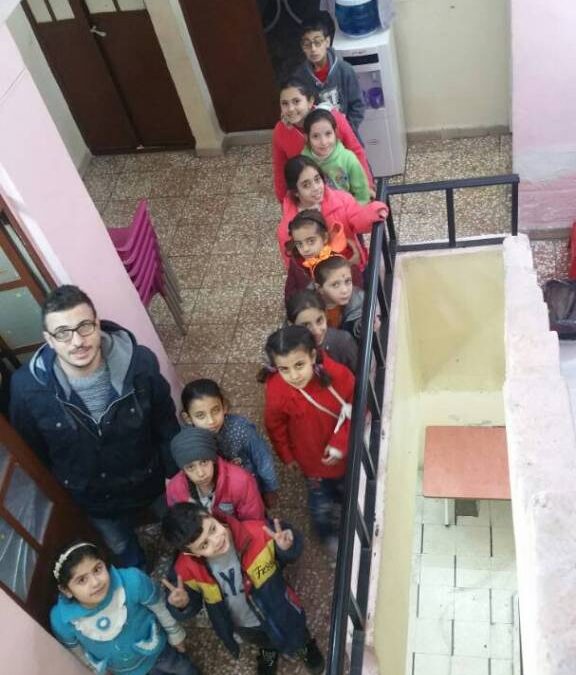
2 May 2018 | Focolare Worldwide
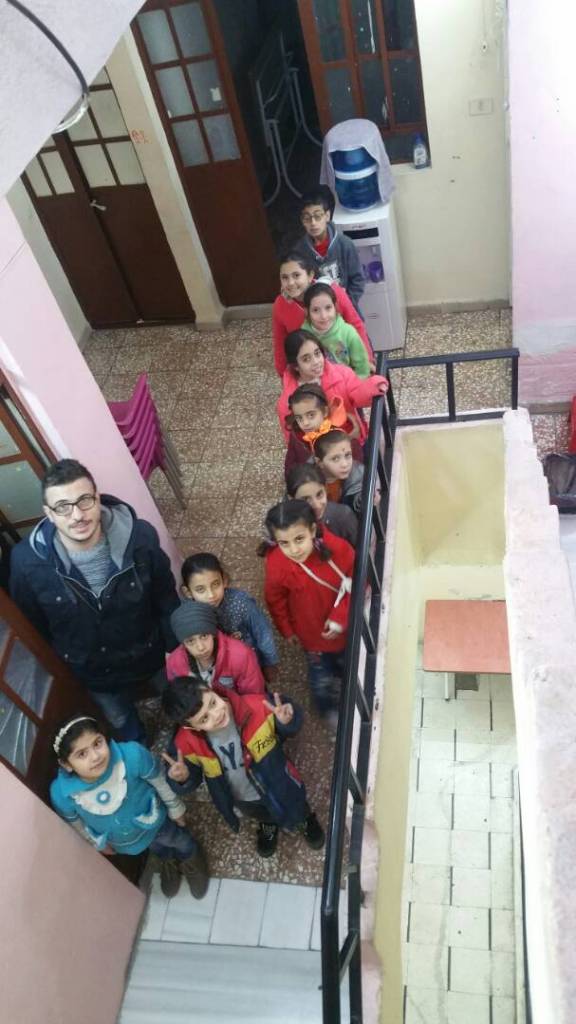
“La Maison des enfants” in Damascus, © Zéna.
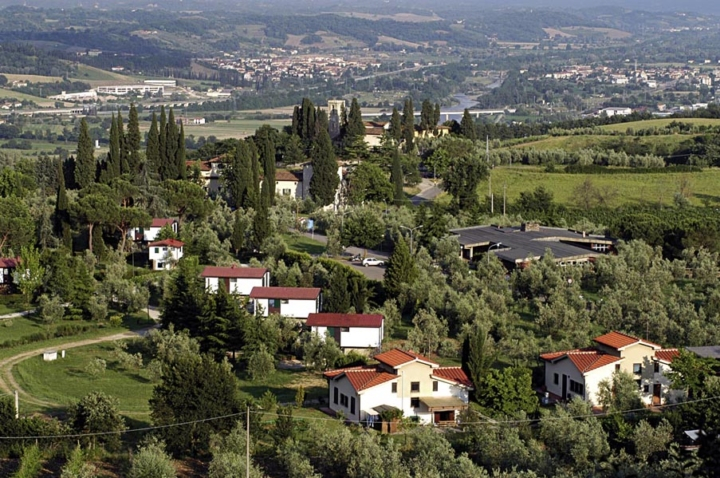
30 Apr 2018 | Focolare Worldwide
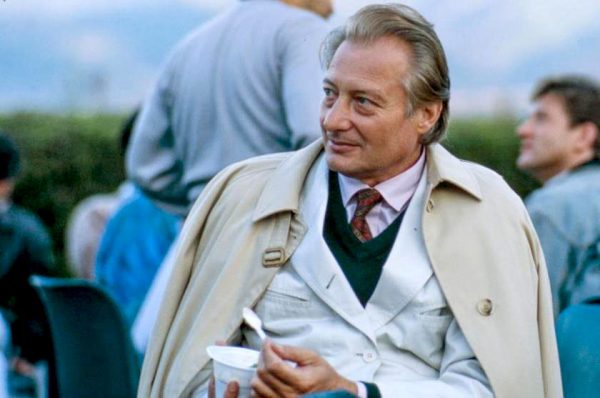
Umberto Giannettoni
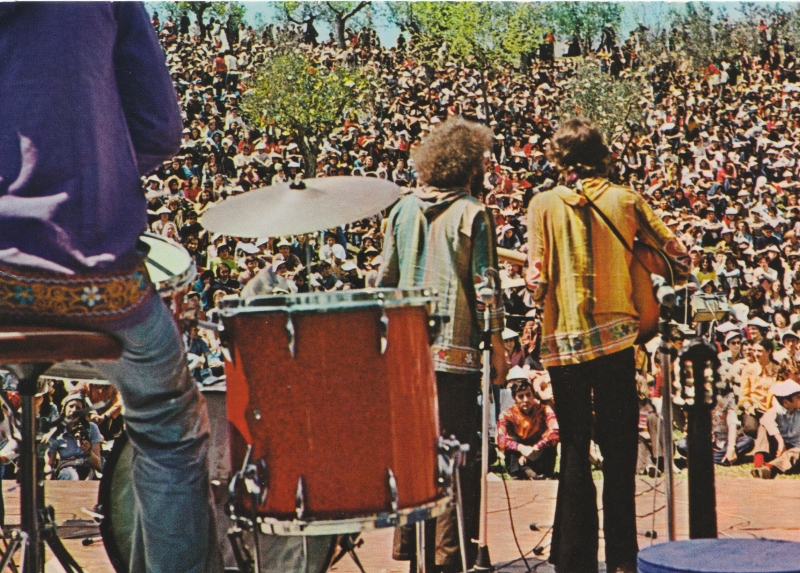 The first youth festival in Loppiano was on 1 May 1971. “After a meeting with the Prior of Taizé in Rocca di Papa (Rome), Chiara Lubich had described the town as a “town of the youth.” On a stopover in Loppiano on his way to Padua, Giorgio Marchetti, a close collaborator of Chiara, recounted what Chiara had said. This news for Umberto was like a flash of light in his soul, and he felt he had to answer Chiara immediately. During the weekend he organised an outing with the heads of the school of the focolare, to the Muraglione Pass in the Apennines. In a bar at the Pass he reflected on the possibility of holding a big meeting of young people in Loppiano, on the first of May […]. The young people of various zones and countries would be invited to participate with an artistic piece. When they left the bar, they were surprised by a particular scenery. The road was a sheet of ice. The rain had caused it after the lowering of the temperature. The vans couldn’t hold the road, and they had the impression that someone wanted to stop them from developing the decision made […].”
The first youth festival in Loppiano was on 1 May 1971. “After a meeting with the Prior of Taizé in Rocca di Papa (Rome), Chiara Lubich had described the town as a “town of the youth.” On a stopover in Loppiano on his way to Padua, Giorgio Marchetti, a close collaborator of Chiara, recounted what Chiara had said. This news for Umberto was like a flash of light in his soul, and he felt he had to answer Chiara immediately. During the weekend he organised an outing with the heads of the school of the focolare, to the Muraglione Pass in the Apennines. In a bar at the Pass he reflected on the possibility of holding a big meeting of young people in Loppiano, on the first of May […]. The young people of various zones and countries would be invited to participate with an artistic piece. When they left the bar, they were surprised by a particular scenery. The road was a sheet of ice. The rain had caused it after the lowering of the temperature. The vans couldn’t hold the road, and they had the impression that someone wanted to stop them from developing the decision made […].”  “There was a very talented group of young people in Loppiano. Among them was Heleno Oliveira, a young Brazilian singer-songwriter, who would have been a big help for the artistic part. Everyone worked hard. On 1 May 1971 in the natural amphitheatre in Campo Giallo, we saw the arrival of thousands and thousands of young people under a splendid sun. The event, to which many in Italy and Europe had contributed, resulted to be very effective for the youth who left in the evening, happy and filled with the divine they had experienced. From Trent came Paolo Bampi, a boy affected by leukaemia, who sang a captivating song: “…but what are you seeking, what do you want…” Then came Gen Rosso with the song, “God who is Love.” Then theatre pieces and dances followed. Each single number was given a “first prize,” which the jury awarded according to various reasons: beauty, unity, content, and commitment. It was a crescendo of sincere and explosive joy which contaminated everyone. As evening came, under the rays of a sun which turned everything gold and in a solemn calm after the intense day […] we strongly felt the presence of Mary.” After a second festive meeting of the youth in 1972 with an even greater attendance, “Chiara Lubich understood that it would be an important tool for the whole youth movement. She decided to involve the World Gen Centres which would participate in the organisation of the “Genfest” of 1973, still in Loppiano. In that year, Fr. Pasquale Foresi (cofounder of the Focolare Movement) was present and gave an important speech on the call to follow Jesus. In the open-air amphitheater, there were almost 10,000 young people. That was the birth of the Genfest! Source: www.loppiano.it Live streaming: https://www.primomaggioloppiano.it/live/
“There was a very talented group of young people in Loppiano. Among them was Heleno Oliveira, a young Brazilian singer-songwriter, who would have been a big help for the artistic part. Everyone worked hard. On 1 May 1971 in the natural amphitheatre in Campo Giallo, we saw the arrival of thousands and thousands of young people under a splendid sun. The event, to which many in Italy and Europe had contributed, resulted to be very effective for the youth who left in the evening, happy and filled with the divine they had experienced. From Trent came Paolo Bampi, a boy affected by leukaemia, who sang a captivating song: “…but what are you seeking, what do you want…” Then came Gen Rosso with the song, “God who is Love.” Then theatre pieces and dances followed. Each single number was given a “first prize,” which the jury awarded according to various reasons: beauty, unity, content, and commitment. It was a crescendo of sincere and explosive joy which contaminated everyone. As evening came, under the rays of a sun which turned everything gold and in a solemn calm after the intense day […] we strongly felt the presence of Mary.” After a second festive meeting of the youth in 1972 with an even greater attendance, “Chiara Lubich understood that it would be an important tool for the whole youth movement. She decided to involve the World Gen Centres which would participate in the organisation of the “Genfest” of 1973, still in Loppiano. In that year, Fr. Pasquale Foresi (cofounder of the Focolare Movement) was present and gave an important speech on the call to follow Jesus. In the open-air amphitheater, there were almost 10,000 young people. That was the birth of the Genfest! Source: www.loppiano.it Live streaming: https://www.primomaggioloppiano.it/live/

 In Loppiano all is ready to welcome the Holy Father. Around 6,000 people from all over Italy are arriving, but thousands will be linked up in streaming in the five continents. We asked Maria Voce, Focolare President, how this encounter will take place. “We want to present to the Pope.” she explained, “this tiny town, the first among other 24 diffused worldwide, which wants to offer a model of coexistence founded on the evangelical principles of solidarity and fraternity, certainly unique, but able to be spread and repeated elsewhere. In Loppiano, the Pope will not only meet the 750 inhabitants, ” Maria Voce continued, “but also a representative group of the Focolare’s global family. We shall ask him some questions on themes that we hold dear: the challenge of fidelity to the charismatic idea of Chiara Lubich in contrast with the changed conditions of today; the education of the young people in a culture of fraternity; and Loppiano’s model of coexistence as a contribution to the current announcement of the Christian message and the overcoming of barriers, nationalism and prejudices.” The Focolare Movement is a variegated constellation that places at the core of its actions and dialogue a lifestyle that concurs to construct unity and peace in the world. It counts over 2 million members belonging to many Christian Churches, but also of different religious beliefs and lay inspirations. It undertakes around 1,000 social actions underway in various countries, and around 800 enterprises worldwide that work according to the principles of the Economy of Communion. The Sophia University, based precisely in Loppiano is now in its tenth year of life.
In Loppiano all is ready to welcome the Holy Father. Around 6,000 people from all over Italy are arriving, but thousands will be linked up in streaming in the five continents. We asked Maria Voce, Focolare President, how this encounter will take place. “We want to present to the Pope.” she explained, “this tiny town, the first among other 24 diffused worldwide, which wants to offer a model of coexistence founded on the evangelical principles of solidarity and fraternity, certainly unique, but able to be spread and repeated elsewhere. In Loppiano, the Pope will not only meet the 750 inhabitants, ” Maria Voce continued, “but also a representative group of the Focolare’s global family. We shall ask him some questions on themes that we hold dear: the challenge of fidelity to the charismatic idea of Chiara Lubich in contrast with the changed conditions of today; the education of the young people in a culture of fraternity; and Loppiano’s model of coexistence as a contribution to the current announcement of the Christian message and the overcoming of barriers, nationalism and prejudices.” The Focolare Movement is a variegated constellation that places at the core of its actions and dialogue a lifestyle that concurs to construct unity and peace in the world. It counts over 2 million members belonging to many Christian Churches, but also of different religious beliefs and lay inspirations. It undertakes around 1,000 social actions underway in various countries, and around 800 enterprises worldwide that work according to the principles of the Economy of Communion. The Sophia University, based precisely in Loppiano is now in its tenth year of life.  Upon his arrival in the town, the Holy Father will go directly to the Church of Maria Theotókos, where he shall stop briefly to pray. He will also pray before the painting of the Madonna with Child, the work of a painter belonging to the Hindu religion and symbol of the dialogue which is one of the many pillars of coexistence in Loppiano. Then in the churchyard, Maria Voce will greet the Pope on behalf of the Focolare Movement. A moment of dialogue will follow in which some citizens of Loppiano will ask him some questions. This session will be interrupted with music pieces of artists from various countries and religious environments. Lastly, around 30 citizens will personally greet the Pope who will leave to return to the Vatican, after the benediction.
Upon his arrival in the town, the Holy Father will go directly to the Church of Maria Theotókos, where he shall stop briefly to pray. He will also pray before the painting of the Madonna with Child, the work of a painter belonging to the Hindu religion and symbol of the dialogue which is one of the many pillars of coexistence in Loppiano. Then in the churchyard, Maria Voce will greet the Pope on behalf of the Focolare Movement. A moment of dialogue will follow in which some citizens of Loppiano will ask him some questions. This session will be interrupted with music pieces of artists from various countries and religious environments. Lastly, around 30 citizens will personally greet the Pope who will leave to return to the Vatican, after the benediction. 









